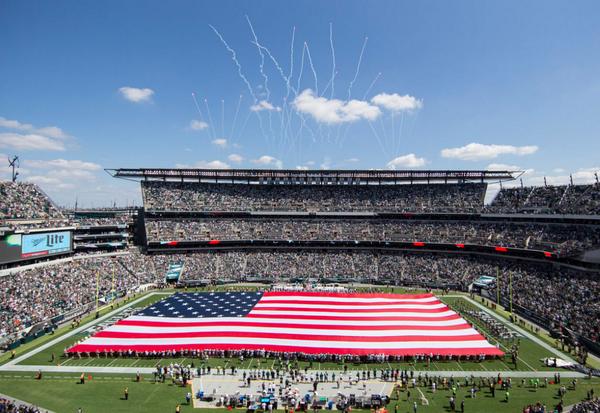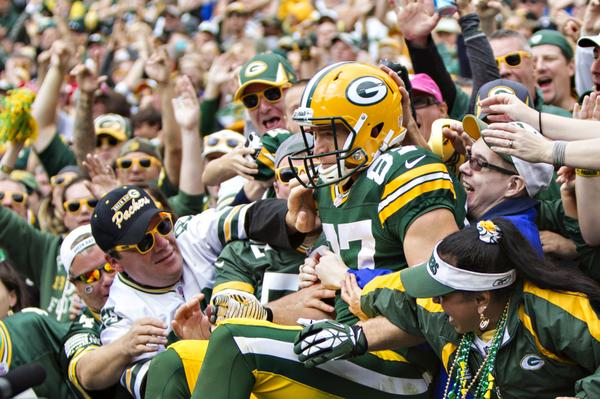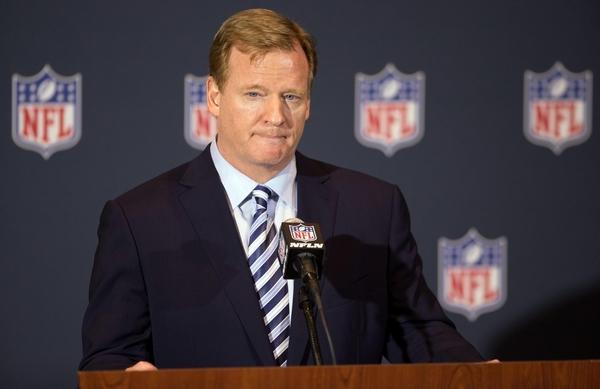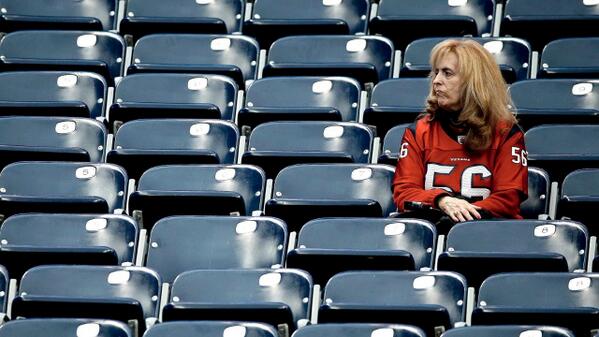The NFL, America's Monster

Remember when talking about the NFL meant talking about actual football?
Remember when we could discuss the Browns quarterback situation? When we could admire the Seahawk’s defense? Remember when we could talk about which rookies would have the most impact? Or which teams would make the playoffs?
Remember when our most controversial issue was Colin Kaepernick wearing a Dolphins hat? Remember when Johnny Manziel going to Vegas was the talk of the town? Or when our biggest point of discussion was whether Los Angeles was finally getting an NFL team?
Those days are long gone.
How about that NBA owner and his general manager in Atlanta who made some racist remarks? That baseball player who was suspended for PEDs? Hey, isn’t Derek Jeter retiring? Team USA won the World Cup! (No, not that World Cup).
This phenomenon is not football-exclusive.
It’s clearer now, more than ever perhaps, who rules not just the headlines, but what sport rules America.
All other sports news—regardless of their importance or controversy—are being brushed swiftly aside and essentially ignored.
So, I ask, how did we get here?
How did we get to the point where talking football has become less and less about what is happening on the field Sundays and more talking about domestic violence, child abuse, drug and alcohol use or a team’s racist name?
SEE MORE: Adrian Peterson Placed On Exempt List
By now, we know the sequence of events.
We know that Ray Rice hit his fiancée, that Greg Hardy was convicted and that Ray McDonald was arrested on domestic violence charges. We know that Adrian Peterson is being indicted and investigated on child abuse charges, and that Cardinals running back Jonathan Dwyer has also been arrested for aggravated assault charges.
Most of all, we know that the NFL has stood by and looked as incompetent and as ignorant and as stupid as ever by not acting upon the controversies as they should have or by retroactively attempting to make amends when it’s far too late to do so.
Sure, the players committed the crimes and they are the ones who broke the rules, but as the faces of the league, they are also the ones who represent it, and they have tarnished their reputation as well as their institution’s.
And it has been that institution whose actions and inactions have been so preposterous lately, that the conversation alarmingly continues to shift from what the players did wrong to what the league does or doesn’t do about it. That tells you all you need to know.
From those who are fans of the league on the inside, to those who stand disinterested on the outside, the conclusion is clear.
The NFL has become a monster. Yes, a monster with a serious image and conduct problem, but also a very powerful, influential and profitable beast.
SEE MORE: The Week I Considered Divorcing Football

Last year, the NFL made about $9 billion in revenue, solidifying its status as the most lucrative league in the world.
Where does all that money come from?
Sponsorships and TV deals make up the biggest portion of that figure with billions coming in from all the major networks, DirectTV, ESPN and plenty of advertisers and corporate sponsors. And why do sponsors and TV companies pay billions of dollars to be a part of the NFL?
Because we watch.
We watch on Sundays. We watch on Mondays. We watch on Thursdays. We even watch on Saturdays.
If there is football on TV, you can bet we will be watching, because football in America is more of a religion than religion itself.
Oh, but it doesn’t stop there. Add on ticket sales for people those who attend the games, not to mention all of the things they buy at the games. And that cool jersey of your team you bought online? Well, millions of Americans do the same, and guess where that money goes? To the NFL.
Those commercials you laugh at during the Super Bowl? $4 million a pop. I’m sorry you wanted a 60-second commercial? That’ll be $8 million, please.
Fantasy football is free right? The Fantasy Football Trade Association would like to differ. They say that about $11 billion a year—sometimes directly, sometimes indirectly—is spent by the American public on fantasy football.
And we haven’t even discussed gambling, which is supposed to be illegal in most states.
Consider this: We live in a world where Roger Goodell makes almost $45 million a year and saying he wants the league to make upwards of $25 billion—with a “B”—by the year 2027 is definitely feasible.
Through our eyes, our computers—and especially our wallets—we are making the NFL a lot of money.
With that money, comes great power, but with that power also comes greed.
Sorry to break it to you, but as much as we want to believe the NFL is simply a sports league that provides us with entertainment, it is not.
It’s a business above all, and when a business has money and it has power, it also has greed. That greed which will make you do anything or refrain from doing anything to retain that power and subsequently retain that money (this is why it took the suspension of sponsorships to push the Vikings to deactivate Adrian Peterson).

SEE MORE: Roger Goodell Safe Behind The Shield
Goodell’s goal of achieving $25 billion in revenue by 2027 isn’t just one to drop our jaws for; it is also a clear and tangible representation of that greed inside the league. No amount of money will ever be enough for him and the owners, because there is never a point of satisfaction once you reach that level of power and wealth. son).
Whether it’s expanding the league domestically and internationally, or expanding the schedule to allow for more games despite continuing concussion issues, or turning a blind-eye to domestic violence to keep players in the game, or refusing to force a change to a team’s racist name, the profitability of the product is always the top priority. Nothing matters but the money, and if hiding, lying, covering up or evading is necessary to preserve the Benjamins, then so be it.
What we've come to find is that Goodell is exceptionally good at this masquerading charade. And this is why, despite all that's happened in recent weeks, his job may be safer than we think.
The problem is that with that power and wealth, also comes great responsibility.
Whether the NFL liked it or realized it, it has become a mirror of society and a type of moral standard that America looks at very closely. It’s a responsibility they inherited, but have continually ignored.
Which is why when they err, and they fail to punish how the public thinks they should punish through this created “moral standard”, they also fail in taking upon that burden of responsibility.
Maybe it’s the power, the money, or the greed that blinds them in making the “right” decision. But an equally important aspect may be to think about who gave them that money and that power in the first place.
Unfortunately, as the aforementioned figures tell the story, we did.
This is why all these issues and all these controversies can’t be solely attributed to the NFL and its players. We have a role in this as well.
Yes, the players broke the laws. Yes, the NFL has failed as an institution multiple times. But we are the ones who enabled them in the first place.
Though not as apparent, it’s a role we must recognize and a role that should make us wonder whether the NFL is really worth our time and our money.
Now, I’m not naive enough to think we will stop watching the games and stop going to the games, and stop giving the NFL our money.
But what I am saying is that we should be aware that there is a slight hypocrisy in ascribing ourselves fan membership to a league on game days when everything is all pristine, but then converting into accusers and condemners and adamant criticizers when that same league or its constituents makes a mistake or fails to live up to that conceived moral standard.
Whether we like it or not, we have enabled this powerful, greed-fueled, money-crazed monster to keep on doing what it does best and nothing else; make money. Where it all goes wrong is when our expectations of what they should do are failed to be met by what they actually do, or don’t do.

Yet the reality of it all is that there’s very little we can do to reverse that fact, because Americans and their football has always been an untouchable thing. Football is a staple of American life.
But reports and assessments are now stating that—in light of recent events—the NFL will become, if it hasn’t already, one of the least-trusted brands in America.
We might not be able to stop this monster, but we can limit its influence. More importantly, we can eliminate the trust we inconceivably and unreasonably had in it. That may be our silver lining, and in a way, it may be our loophole.
There is a slight hope and possibility that the NFL will someday cease to be a mirror of society, and that we will cease to view it as moral standard for what is good and what is wrong.
If we finally see it for what it really is we can strip it of that responsibility we indirectly gave it, because we now know it doesn’t deserve it.
And who knows, maybe one day we’ll realize it doesn’t deserve our money either.
Reach Web Producer Paolo Uggetti here or follow him on Twitter.



